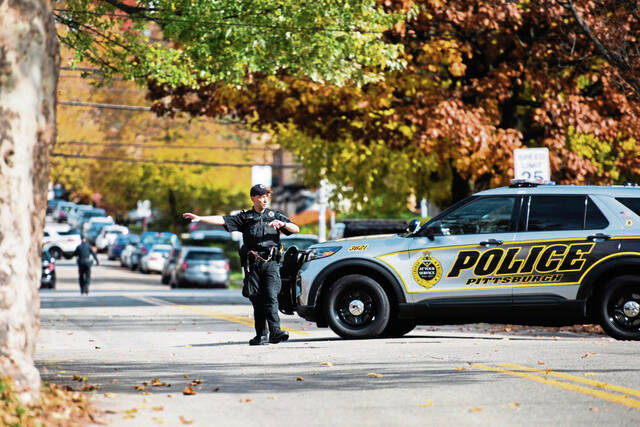Two Pittsburgh police officers and their supervisor were disciplined last fall after they failed to provide a police presence at a Brighton Heights funeral in October where five people were shot.
Those details were revealed last week in an arbitration appeal in Allegheny County Common Pleas Court after one of the officers had his five-day, unpaid suspension reduced to an oral reprimand.
The city filed an appeal seeking to have the five-day suspension of Officer Thomas Potts reinstated, accusing the lead arbitrator of improperly interpreting the “just cause” standard used to discipline the officer.
“The undisputed evidence shows that Officer Potts (and Officer Dalton Dailey) did not report for the funeral detail,” the city wrote in its appeal. “Instead, Potts went to the uniform store without permission. The undisputed evidence shows that the results were tragic: Five mourners were shot at the funeral service.”
Potts, who joined the department in December 2016, was charged in a disciplinary action report in November with insubordination, neglect of duty, truthfulness, conduct unbecoming an officer and leaving the city while on duty.
Initially, Acting Police Chief Thomas Stangrecki recommended a five-day unpaid suspension with intent to dismiss.
However, Public Safety Direct Lee Schmidt reduced it to a suspension only, which Potts had already served.
The Fraternal Order of Police, the union that represents officers, filed a grievance, demanding arbitration.
Following a two-day arbitration hearing before a three-person panel, Potts’ punishment was reduced in early August to an oral reprimand. He was found guilty, the opinion said, only of neglect of duty and conduct unbecoming an officer.
According to the city’s appeal, Potts and his partner, Officer Dalton Dailey, were assigned a two-officer car at roll call on the morning of Oct. 28. They were told by Sgt. Michael Burford that they were to report that day to Destiny of Faith Church where the funeral for John Hornezes Jr. was to be held. Hornezes had been killed weeks earlier as part of an ongoing feud on the North Side.
The officers were provided the time, 11 a.m., and the address of the church.
However, during the arbitration hearing, Potts claimed he was told that the report time for the funeral detail was 10 a.m.
That morning, Potts and Dailey left the city before 10 a.m. to pick up uniform pants, for which Burford had given conditional approval the previous day, “advising (Potts) to go early … when things were expected to be quiet.”
Shortly before 10 a.m., Burford called the two officers and ordered them to return to Zone 1 headquarters because Dailey had to file a special report for missing court earlier in the week.
The officers arrived between 10:30 and 11 a.m. According to the arbitration panel, Burford knew the officers were there but did not say anything about the funeral detail.
Then, after 12 p.m., they heard calls for the attack at the church on Brighton Road.
Five people were shot and wounded, as well as a police horse. Another person was injured trying to escape.
On the day of the shooting, the Rev. Brenda Gregg, the church’s founder and senior pastor, told the Tribune-Review that she asked Pittsburgh police beforehand to send officers to the funeral service.
Acting Police Chief Thomas Stangrecki confirmed that the following week.
“We regret that (Pittsburgh Bureau of Police) did not provide the presence asked of us on this difficult day,” Stangrecki said at the time.
He said there would be an internal investigation.
“As not only police officers, but members of this community, we consider this totally unacceptable,” Stangrecki said then.
During the arbitration hearing, the FOP argued that the internal investigation showed Burford knew Potts and Dailey were going to the uniform store and did not object. The funeral detail, the FOP said, “had not been given a high priority.”
Further, the FOP argued that after the incident, the city established a new policy for funeral details “which proves … that the procedures — if any — in place on Oct. 28, 2022, were deficient.”
Relative to the punishment, the FOP told the arbitration panel that Dailey’s initial five-day suspension was reduced to an oral reprimand, and that Burford’s initial five-day suspension was reduced to counseling, which is not considered to be disciplinary in nature.
The city countered that Potts never informed dispatch he was going to the uniform store as required. The city also claimed that Potts lied to Stangrecki in his statement when he said he undeniably had permission to go to the store.
In explaining why Burford did not question Potts and Dailey why they weren’t at the funeral when he summoned them back to the zone, the city said the sergeant thought the detail had already been completed.
In their Aug. 4 finding, the majority of the arbitration panel — neutral arbitrator Ralph H. Colflesh and FOP President Robert Swartzwelder — found that the truthfulness charge could not be sustained because there was no evidence Potts willingly and knowingly lied.
The panel also found that Potts did not improperly leave the city to go to the uniform store because Burford condoned the trip and it was to pick up police uniform pants.
The panel did not find that Potts was insubordinate because it said Burford knew Potts was not following his orders to go to the funeral and did nothing about it.
“By his inaction, Sgt. Burford essentially either countermanded his order and/or condoned Officer Potts’ failure to follow it,” the panel majority wrote. “No employer can give an order, have direct and unmistakable knowledge the order is not being carried out, take no action whatsoever, and then discipline a subordinate for not following it.”
The panel did sustain the neglect of duty charge against Potts.
“In this case, Officer Potts knew or should have known of the possibility of violence at the funeral of a street gangster who had been killed by rivals and whose funeral would likely be attended by members of his associates,” the panel wrote.
“As the bureau recognized, it was imperative to have a police presence at the funeral, and as a member charged with that detail, Officer Potts was negligent, even in light of Sgt. Burford’s apparent disinterest in having his original order fulfilled, in neither providing his presence nor taking steps to assure his presence was not required,” the panel added.
The panel also found Potts guilty of conduct unbecoming an officer.
Based on their findings, the panel said Potts’ punishment should be reduced to an oral reprimand and he should be reimbursed for the five-day unpaid suspension.
The city’s appeal accuses Colflesh of exceeding his jurisdiction and invading the city’s managerial authority.








